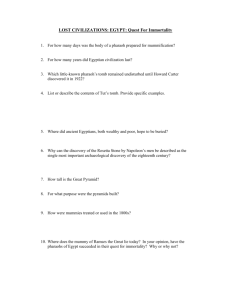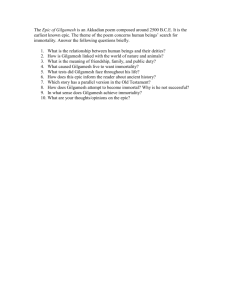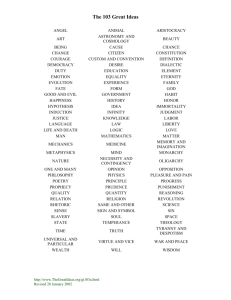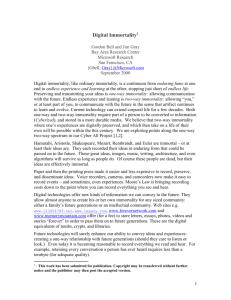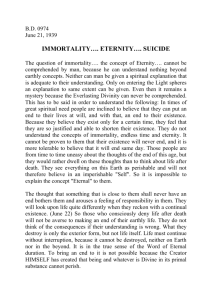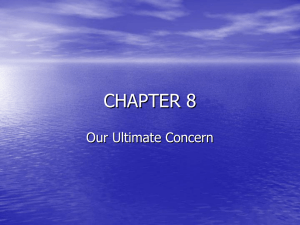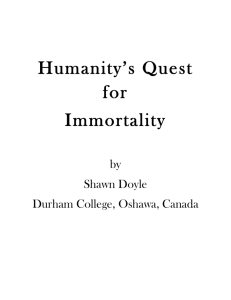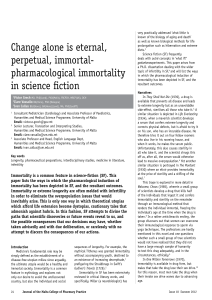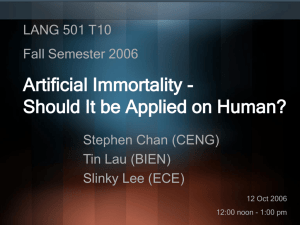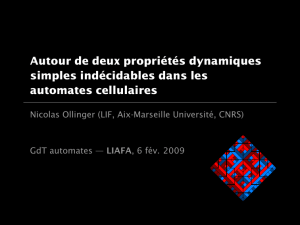Cyberpunk Presentation 2
advertisement
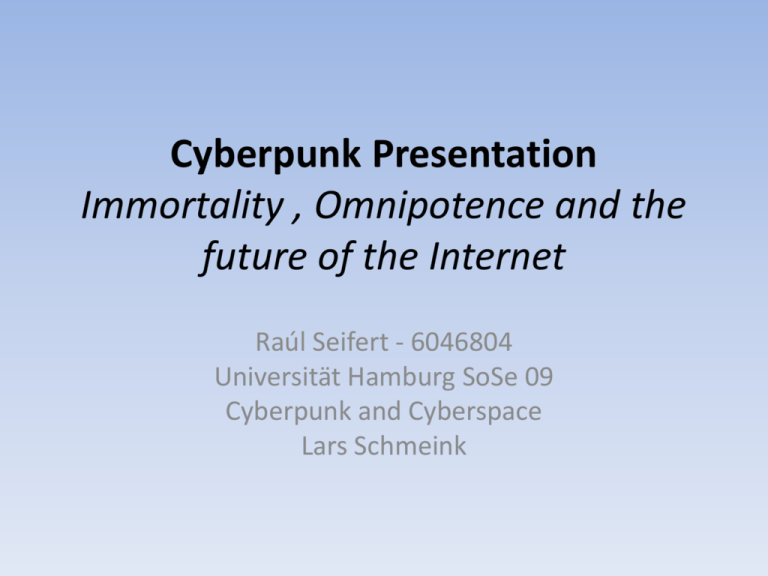
Cyberpunk Presentation Immortality , Omnipotence and the future of the Internet Raúl Seifert - 6046804 Universität Hamburg SoSe 09 Cyberpunk and Cyberspace Lars Schmeink Overview and Introduction • • • • • • • Introduction Immortality and Omnipotence Examples in literature and movies History and Future of the Internet Conclusion and Thesis Questions for discussion Bibliography Introduction “Today I will give my presentation on the chosen cyberspace interest of mine. Namely the future of the Internet. If you have read my Blog article about Immortality and Omnipotence, you will notice that I tried to blend both topics into one. I will start with a short overview of the terminology, continue with examples, briefly discuss the history and future of the Internet. Finally I will present my conclusion & thesis and also questions for further discussion.” Immortality "I don't want to achieve immortality through my work.. "I want to achieve it through not dying.“ – Woody Allen, Actor • Is a concept of living for an infinite amount of time. Also called „eternal life“. • This idea very old and is a typical feat of important religious figures, mythological creatures and (Demi)Gods. • One of the oldest myths about the striving for immortality is the mesopotamic poem Gilgamesh. Omnipotence • Comes from the latin „omni potens“ which translates as „all power“ or „unlimited power“. • It is most commonly associated with the idea and concept of a God or Godlike being. • Closely connected with the idea of Immortality in most major religions. • Omnipotence also includes the related concept of Omniscience – the power to know everything. • The process of obtaining omnipotence or godhood is called “apotheosis” (from the Greek word apotheoo = to deify) Gilgamesh - Example from early literature • The Epic of Gilgamesh is an ancient mesopotamic poem dating back at least to the 22nd century BCE. • It is among the oldest works of fiction known to man and one of the first written accounts of the human desire for immortality. • The epic poem is about the incredibly powerful, almost godlike king Gilgamesh and his search for Immortality following the death of his friend Enkidu. Immortality and Omnipotence in the Cyberpunk genre • Neuromancer by William Gibson: The Dixie Flatline construct is a deceased human hacker named McCoy whose mind and it’s contents are saved onto a ROM. Ironically the Dixie Flatline wants itself to be removed and it’s immortality ended. • The perverse and degenerated Tessier-Ashpool family tries to escape the natural process of aging and dying by cloning and freezing themselves via cryonic preservation. • The A.I.’s Wintermute and Neuromancer can both be considered immortal. • • Otherland by Tad Williams: The search for Immortality in a artificial reality can be considered the leitmotif of the Otherland quadrilogy. The Brotherhood of the Grail (!) develops an extremely advanced AR with the single goal of becoming immortal gods in their particular Artificial reality. In the short story True Names by Cyberspace pioneer Vernor Vinge, the two hacker protagonists ascend to virtual godhood but ultimately reject the unfathomable power. Later in the story it is revealed that one of them plans to transfer her personality into cyberspace and become immortal in the process. Examples (continued) • In the movie Matrix , the main protagonist Neo the Chosen One is immortal inside the virtual Matrix. When he is killed by Agent Smith, his real body dies but shortly resurrects with newfound power. Also programs like the Oracle, the Architect or Agent Smith are Immortal and in parts omnipotent. Especially Smith at the end of the third movie. • • The movie Colossus: The Forbin Project is an early movie about the takeover of a manmade hostile supercomputer. Though the movie itself cannot be called Cyberpunk, some elements of the plot seem familiar from newer literature and movies. A brief history of the Internet • J.C.R. Licklider of MIT was the first one to propose a global network of computers in 1962. • The first form of long range connection between two computers was accomplished in 1965 over dial-up telephone lines. • The predecessor of the Internet was called ARPANET and went online in 1969. It was first developed for military purposes. History of the Internet (continued) • The important “ftp protocol”, which enables file transfer between different internet sites is developed in 1973, later in 1983 the TCP/IP architecture is universally adopted. • In 1989 scientists from CERN (Switzerland) propose a new protocol for information distribution. This protocol became the hypertext based World Wide Web we know today. • Implementations such as better search engines and new internet browsers make the web easily accessible for almost everyone around the year 2000. Future Outlook on the Internet • The Internet and the WWW are already a part of the daily lives of countless people. Web-communities connect people even better with each other and make the exchange of knowledge even simpler than before. • The full impact the internet has made on civilization as a whole still remains to be seen. • Internet connections have become the norm in industrialized countries. Prices for connections and barriers for entry have dropped significantly. • Nearly everything mankind has ever known is archived somewhere in the web. • Future technologies will further connect the human user with the internet. It is also said by Scientists and Futurists that technological singularity could be achieved in the next 30 to 50 years. Internet outlook (continued) • The number of internet users in the developed world and other parts has increased enormously over the last 10-12 years. The Internet as an entity or threat ? • • • Graphical illustrations of the Internet look almost like a (human) brain with billions of neurons firing at the same time and connections everywhere in every direction. If in the future a strong A.I. is successfully created, this Intelligence could incorporate all of mankind’s knowledge into itself and if not properly restrained would become near omnipotent with control over the worlds bank accounts, nuclear silos etc. At least this is what popular Cyberpunk stories suggest. This thought is in so far doubly terrifying, since the Internet as an entity of pure information couldn’t be fought in any way unless all computers worldwide were shut down simultaneously and their power taken away. And even then as the movie “The Matrix” makes us believe a malevolent, hyperintelligent A.I. could probably still find ways around that. Conclusion and Thesis • The use and deveIopment of the internet will influence the future of humanity in a significant way. Through the connection and knowledge of billions of minds, there is no saying to what could be achieved. I believe if there is any possibility immortality and in consequence omnipotence could be possibly achieved via the internet of the future, a strong A.I. or bodily augmentation, people will go that route, wherever it may lead. • I hope you enjoyed my presentation, if you have any questions feel free to mail me under r-seifert@hotmail.de Possible Questions for further Discussion • Do you think it could be even remotely possible that Immortality is attainable through electronic means? For example with the fictive process of copying or saving a human consciousness on data? • And finally do you think the Internet as an abstract being of interconnected supercomputers and human minds could one day gain consciousness? A “Manmade God” so to say. Is this a desirable goal? Bibliography and References • Gibson, William. Neuromancer. New York: ACE Books, 1984 • Hooker, Richard, Mesopotamia - Gilgamesh Summary, Washington State University 1996 (available under http://www.wsu.edu/~dee/MESO/GILG.HTM last visited June 7th, 2009) • Kurzweil, Ray, The Age of Spiritual Machines: When Computers Exceed Human Intelligence, New York, NY: Penguin, 1999 • Ruthfield, Scott, The Internet's History and Development - From Wartime Tool to the Fish-Cam. Houston, TX, Rice University 1995 (available under http://www.acm.org/crossroads/xrds2-1/inet-history.html last visited June 7th, 2009) • The Standford Encyclopedia of Philosophy : Article on Omnipotence (availabe under http://plato.stanford.edu/entries/omnipotence/ last visited June 7th, 2009) • Vinge Vernor, Novella -True Names in: Dell Binary Star 5, 1981 (available under http://web.archive.org/web/20051127010734/http://home.comcast.net/~kngjon/truename/truename.html last visited June 7th, 2009) Vinge Vernor, What if the Singularity does NOT happen? Originally presented at Long Now Foundation Seminars About Long Term Thinking, February 15, 2007. Published with permission on KurzweilAI.net March 14, 2007. (available under http://www.kurzweilai.net/meme/frame.html?main=memelist.html?m=1%23696 last visited June 7th, 2009) • • Wachowski, Andy and Larry , The Matrix, Warner Brothers and Village Roadshow Pictures, 1999 • Williams, Ted, Otherland, New York, NY: DAW Books Inc. 1996
